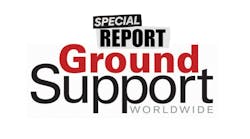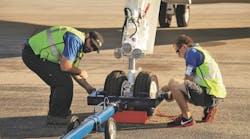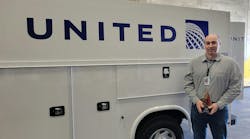"Head" line
Cylinder manufacturers offer good choices for replacement cylinder heads
By Greg Napert
March 1999
aced with a multitude of choices for replacement parts today, technicians can find themselves between a rock and a hard place when trying to determine what to recommend to their customers.
The technician's recommendation to an aircraft owner is often a delicate balance between past experience, as well as Federal Regulation (government approvals) and owner's pocketbooks.
The cylinder replacement decision is not all that difficult considering there are only four companies that manufacture new cylinders, but the decision becomes more complex when faced with the option of repairing, coating, or rebarreling the old cylinder.
New cylinders today are available from both original equipment manufacturers (OEMs) Textron Lycoming and Teledyne Continental Motors, as well as from aftermarket suppliers Superior Airparts (Millennium™) and Engine Components, Inc. (Classic Cast™).
The latter two, Superior and ECI, offer "design improvements" over the OEM's cylinders with one cylinder, the Millennium by Superior, selling at a premium for the improvements.
AMT magazine interviewed several top overhaulers on their opinions related to cylinders. While most did not want to comment on their preferences on record (many are distributors and approved sales outlets for the cylinder manufacturers), the comments related to cylinders can be summarized in the following points:
• Only select improved cylinder designs if you are dealing with higher powered engines or engines that are hard-use/high-time. Smaller, low-time engines in general, do not take the punishment of a big bore engine and would not necessarily require thru-hardened barrels or beefier castings.
• Repaired cylinders are a good option for engines that are at mid-life. If you want an overhaul to go to TBO, a new cylinder is generally a better option. However, there are some exceptions.
• Consider the warranty and level of support. If you have to fight for every warranty return, it may not be worth dealing with that manufacturer. A manufacturer that has a "no-hassle" policy is worth a great deal when you replace cylinders for a living.
• Remember that each cylinder model has its own characteristics — regardless of the manufacturer. Saying that one brand is better than the other is like saying all Fords are better than all Chevys — so work with your local overhauler to determine the best choice for your circumstance.
OEMs insist on using only "New" cylinders
OEMs insist on using only "New" cylinders
Too many problems with heads cracking, they say March 1999
According to an article in the Lycoming Flyer Key Reprints, Textron
Lycoming metallurgists argue that welding of cracks in aluminum cylinder heads is not likely to meet with long-term success. Therefore, an overhauled cylinder has little chance of being as serviceable as a new cylinder. Even if there were no cracks at the time of overhaul, metal fatigue is still a factor to be considered. But, how can you even determine metal fatigue? There is no record of time in use required for a cylinder assembly. An overhauled cylinder could have 4,000, 6,000, or 8,000 hours or more when it is put on an overhauled engine. Even a cylinder from your own engine with only one trip to TBO may not make it to TBO a second time.
As a result of this scenario, Lycoming has for many years recommended new cylinders when engines are overhauled. To practice what they preach, Lycoming uses new cylinders on all engines shipped from the factory at Williamsport, PA, including factory overhauls. It is less expensive to install new cylinders during the overhaul as compared to having the engine torn down once or twice for cylinder replacement before it reaches the recommended TBO as an overhauled engine, says Lycoming. The added reliability must also be considered.
Essentially, Teledyne Continental Motors takes the same view of cylinders, although their approach has been more liberal in the past, and it is only in the last couple of years that they have gone to using all new cylinders on factory rebuilt engines.
Terry Horton, sales and service representative for TCM, says that for a number of years, Continental supplied reworked cylinders with channel-chromed surfaces. He says that the company eventually learned of Cermicrome®, and because there were less break-in problems associated with Cermicrome (the ceramic particles aid in the break-in process), Continental eventually abandoned the channel-chrome process altogether.
Horton explains that a few years ago, the company began to see a marked increase in the number of cracked cylinder heads. Because of this, they made the decision to discontinue the use of reworked cylinders and use only new. "We found that the head was just becoming too much of a problem. All of our warranty claims were on cracked cylinder heads. It was becoming apparent that it really wasn't worth it to recondition the bore and still have a bad head. Some of these cylinders have been around for a long time, and we had no way of knowing how much time was on them."
Horton says another factor that contributed to Continental going to the exclusive use of new nitrided cylinders was the company had invested heavily in new manufacturing processes and equipment which had lowered the cost of a new cylinder assembly. Because of this it just didn't make economic sense anymore to use refurbished cylinders. The little savings realized from refurbishing the cylinders just wasn't worth the problems that existed with the cylinder heads.
He explains that TCM still keeps open an option for Cermicrome cylinder coating for customers who desire chromed cylinders. "For roughly an additional $100 per cylinder, we will take new cylinders and have them Cermicromed. Channel-chrome is no longer an option."
Non-OEM New Cylinders Offer "Improvements."
Non-OEM New Cylinders Offer "Improvements."
Until recently, the only option you had if you wanted to purchase a new cylinder was to go directly to the engine manufacturer. Aircraft cylinders are a very complex part to manufacture; intricate detail, complex curves, exotic materials, and precise heat treating make it a very expensive part to manufacture as well. So up until now, aftermarket manufacturers have shied away from making replacement cylinders.
Superior Air Parts of Addison, TX, entered the market in 1993 with a line of cylinders it calls its Millennium® Series cylinder. The all-new cylinder was the first non-OEM aftermarket replacement cylinder available. Its original cylinders were replacement cylinders for the Lycoming O-235 and TCM O-200 engines. Since then, Superior has widely expanded the line of cylinders — recently introducing replacement cylinders for Continental A-65, 470, and the 520 engine line.
Superior has marketed its cylinders as an "improvement" over the OEM cylinder with engineering changes such as through-hardened cylinder barrels, increased port wall thickness, and thinner, more even cylinder fins for better cooling.
The changes are apparent as its precision molding processes result in a much smoother surface and fewer casting imperfections, thereby making it a "better looking" cylinder.
If you want more information on Millennium cylinders, contact Superior at (800) 487-4884.
The latest entry into the market for "all new" aftermarket cylinders is the company that has lead the industry in the refurbished cylinder market — Engine Components, Inc. (ECI). ECI announced in October an expansion to its line of engine cylinder products to include an all-new cylinder assembly replacement for Lycoming 320, 360, and 540 engines.
The assembly includes a traditional Classic™ sand cast cylinder head combined with a through- hardened steel cylinder. ECI's CEO, Gary Garvens says that ECI's objective is to offer its customers some options for cylinder replacement. In addition to offering complete new cylinder assemblies, ECI offers the combination of a new head mated with a remanufactured barrel (coated with Cerminil®); a heat-treated head mated with a new barrel; or a heat-treated head mated with a remanufactured barrel (coated with Cerminil).
Garvens says, "Aircraft owners have always had to take whatever the cylinder manufacturer served up. Now they finally have the ability to choose from a few different options."
For more information on ECI cylinders, call (800) 324-2359.











